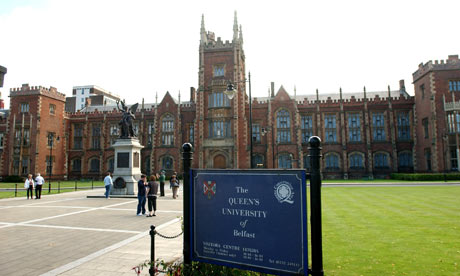Climate sceptic wins landmark data victory 'for price of a stamp'
An arch-critic of climate scientists has won a major victory in his campaign to win access to British university data that could reveal details of Europe's past climate.
In a landmark ruling, the UK government Information Commissioner's Office has ruled that Queen's University Belfast must hand over data obtained during 40 years of research into 7,000 years of Irish tree rings to a City banker and part-time climate analyst, Doug Keenan.

The Queen's University of Belfast, Northern Ireland, must hand over 40 years' worth of data on 7,000 years of Irish tree rings. Photograph: Ron Sachs / Rex Features/Rex Features
This week, the Belfast ecologist who collected most of the data, Professor Mike Baillie, described the ruling as "a staggering injustice ... We are the ones who trudged miles over bogs and fields carrying chain saws. We prepared the samples and - using quite a lot of expertise and judgment – we measured the ring patterns. Each ring pattern therefore has strong claims to be our copyright. Now, for the price of a stamp, Keenan feels he is entitled to be given all this data."
Keenan revealed this week that he is launching a new assault. On Monday, he demanded the university also hand over emails that could reveal a three-year conspiracy to block his data request.
Keenan has become notorious for pursuing a series of vitriolic disputes with British academics over climate data. Two years ago, he accused Phil Jones of the Climatic Research Unit (CRU) at the University of East Anglia of "fraud" over his analysis of data from weather stations in China. Jones recently conceded he may have to revise the paper concerned.
The latest ruling comes from Graham Smith, deputy information commissioner, who in January said information requests to CRU from climate sceptics were "not dealt with as they should have been under the legislation." In the Belfast case, as well as insisting the university hand over the data, Smith has accused the university authorities of "a number of procedural breaches."
The case goes back to April 2007, when Keenan asked Queen's University for all data from tree-ring studies by Baillie and others. The data covers more than 7,000 years. They contain upwards of 1m measurements from 11,000 tree samples, mostly of oak. The university turned down Keenan's request, citing a range of exemptions allowed under both the Freedom of Information Act and the European Union's environmental information regulations. Keenan appealed to the information commissioner.
Over the subsequent three years, the university has claimed that it did not have to supply the data because it would be too time-consuming; because the data does not amount to environmental information; because the research is unfinished; because the data is private property, commercially confidential and of "negligible" public interest – and because Keenan would not understand them.
But Smith says the university, one of the world's leading centres for tree-ring research, is wrong on each count. His judgment notes that rather than taking 12 months to collate the data, as the university at first claimed, it would take 12 hours. Smith chastised the university for failing to comply with a number of regulations in assessing Keenan's original request. The university has until 3 May to provide the data to Keenan, unless it appeals. The university says it is "considering its position."
Keenan says he believes the Irish tree rings could bolster the case that there was a widespread medieval warm period on Earth 1,000 years ago. This is contentious because it would question the suggestion that warming in the 20th century was unique in recent history.
Baillie says his data won't help either way in this argument. Last year he and his Belfast colleague Ana Garcia-Suarez, published a study showing that Irish oaks record summer rainfall well, but not temperature. "Keenan is the only person in the world claiming that our oak-ring patterns are temperature records," Baillie told the Guardian.
Keenan, who admits he has no expertise in tree-ring analysis, says that whatever the data may or may not reveal, the university has no right to keep the data secret. The deputy information commissioner agrees.
The finding, combined with Smith's earlier strictures against the University of East Anglia, could have widespread repercussions for academic research. Baillie calls the ruling "a direct, and unpleasant, off-shoot of the information revolution. It now appears that research data can be demanded, and indeed obtained, by anyone."

No comments:
Post a Comment